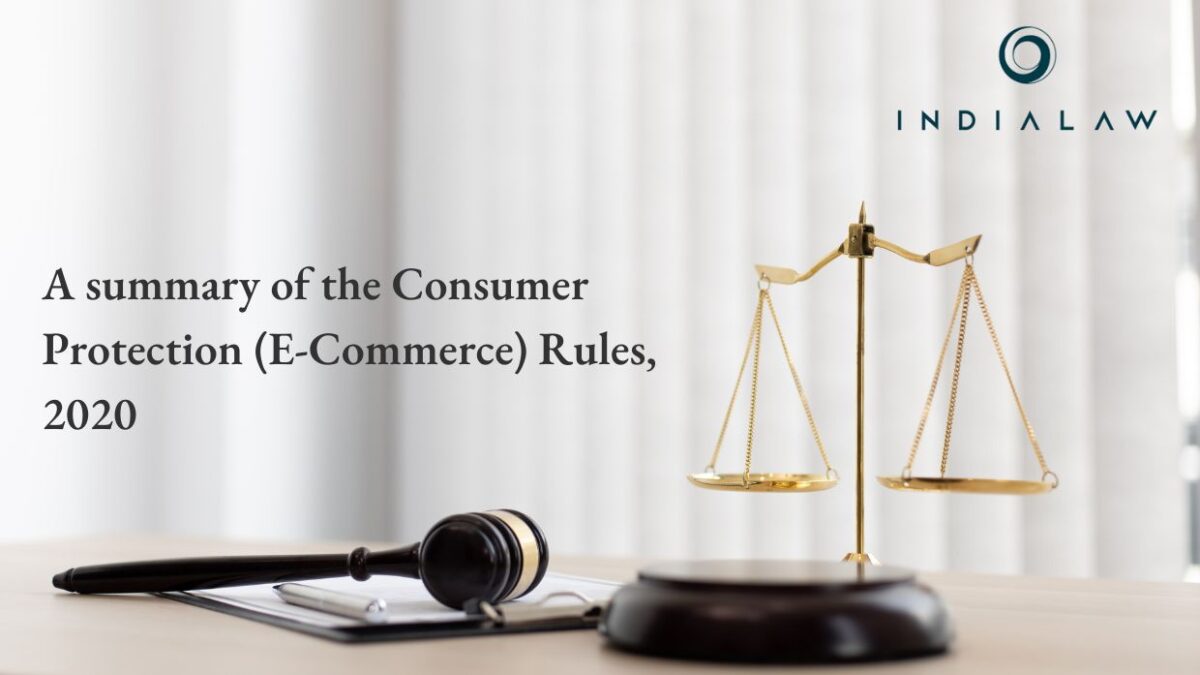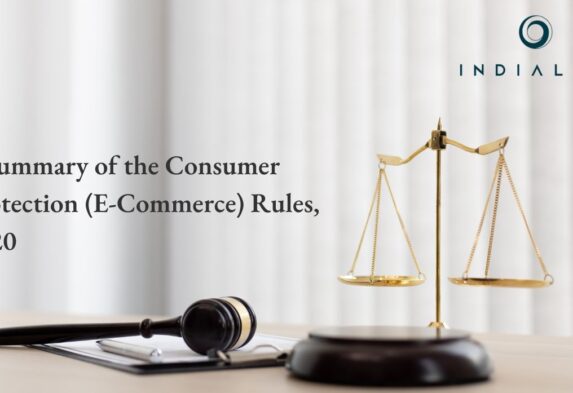A summary of the Consumer Protection (E-Commerce) Rules, 2020


The Consumer Protection (E-Commerce) Rules, 2020 were framed under the Consumer Protection Act, 2019, to regulate the operations of e-commerce entities and protect the interests of consumers transacting online. These rules establish a framework that emphasizes transparency, fairness, accountability, and efficient grievance redressal mechanisms across all types of e-commerce platforms.
Table of Contents
Who They Apply To:
- These rules apply to all goods and services sold online, including digital products.
- They cover all types of e-commerce models, like marketplace and inventory models.
- They include all forms of online retail, whether it’s a single brand or a multi-channel retailer.
- They address unfair trade practices in all e-commerce models.
Exemptions:
- The rules do not apply to individuals selling items occasionally for personal use, not as part of a business.
- They do apply to foreign e-commerce businesses that sell goods or services to consumers in India, even if they are not based in India.
Duties of e-commerce entities:
- Legal Requirements: E-commerce companies must be registered under Indian law or as foreign companies with a presence in India.
- Contact Person: They must appoint a contact person in India to ensure they follow the rules.
- Information Disclosure: E-commerce platforms must clearly display:
- The legal name of the company.
- The main address of their headquarters and branches.
- Website details.
- Customer support contact information, including email and phone numbers.
- Fair Practices: E-commerce entities cannot engage in unfair trade practices on their platforms.
- Grievance Mechanism: They must have a proper system to handle customer complaints, including appointing a grievance officer whose details should be visible on their site. The officer must acknowledge complaints within 48 hours and resolve them within one month.
- Imported Goods: If selling imported items, they must disclose the name of the importer.
- Consumer Helpline: E-commerce businesses should cooperate with the National Consumer Helpline.
- Cancellation Charges: They cannot charge consumers for cancellations unless they also bear similar charges if they cancel.
- Consent for Purchases: They can only record consumer consent for purchases if the consent is clearly given, not through pre-checked boxes.
- Refunds: E-commerce entities must process refunds quickly according to the rules set by the Reserve Bank of India.
- Pricing and Discrimination: They must not manipulate prices to make unfair profits and cannot discriminate between customers of the same class.
Liabilities of marketplace e-commerce entities:
- Legal Compliance: Marketplace e-commerce entities must follow specific rules to avoid legal liability under the Information Technology Act, 2000.
- Seller Responsibilities: They must require sellers to provide accurate descriptions and images of the goods or services they offer on the platform.
- Information for Consumers: Marketplace entities must clearly display the following information for users:
- Details about sellers, including their business name, address, customer care number, and ratings.
- If a consumer requests it after making a purchase, the platform must provide information about the seller, including their address, website, and contact details for dispute resolution.
- A ticket number for tracking complaints.
- Information on returns, refunds, exchanges, warranties, delivery, payment methods, and how to resolve grievances.
- Security details for payment methods, any fees, and how to cancel payments.
- Information from sellers as required.
- An explanation of how products or sellers are ranked on the platform.
- Terms and Conditions: The platform must include any special treatment of certain sellers or products in its terms and conditions.
- Record Keeping: They should keep a record of sellers who have previously offered goods that violated copyright or trademark laws. However, they are not required to remove these sellers from the platform unless they choose to do so.
The duties of sellers on a marketplace:
- Fair Practices: Sellers must not engage in unfair trade practices when selling goods or services.
- Honesty in Reviews: Sellers cannot pretend to be consumers to post fake reviews or misrepresent the quality or features of their products.
- Returns and Refunds: Sellers must accept returns and provide refunds for defective or misrepresented goods or services, including late deliveries, unless the delay was due to unavoidable circumstances (force majeure).
- Contracts and Contact:
- Sellers need a written contract with the e-commerce platform to sell their products.
- They must appoint a grievance officer to handle consumer complaints, who should acknowledge complaints within 48 hours and resolve them within one month.
- Accurate Advertising: Sellers must ensure that their advertisements match the actual characteristics and usage conditions of the products or services.
- Required Information: Sellers must provide the e-commerce platform with:
- Their legal name and address.
- Website details and customer care contact information.
- GSTIN and PAN details, if applicable.
- Display Information: Sellers must provide accurate information to be displayed on the platform, including:
- The total price and a breakdown of any charges.
- Mandatory notices and expiry dates for products.
- Details about the goods, including country of origin.
- Contact details for the grievance officer.
- Information about the importer and guarantees for imported products.
- Clear terms for returns and refunds, including shipping costs.
- Delivery and shipment details.
- Any applicable guarantees or warranties for the goods or services
Duties and liabilities of inventory e-commerce entities:
- Information Display: Inventory e-commerce entities must clearly display important information for users, including:
- Details about returns, refunds, exchanges, warranties, delivery, shipping costs, payment methods, and how to resolve complaints.
- All mandatory legal notices.
- Security information for payment methods, including cancellation procedures and any fees.
- The total price of goods, including a breakdown of all charges like delivery and taxes.
- A ticket number for tracking complaints.
- Honesty in Reviews: They must not pretend to be consumers to post fake reviews or misrepresent the quality of their products.
- Accurate Advertising: Advertisements must accurately reflect the actual characteristics and usage of the goods or services.
- Returns and Refunds: They cannot refuse to accept returns or provide refunds for defective products or services that do not match their descriptions, including late deliveries, unless the delay was due to unavoidable circumstances (force majeure).
- Liability for Authenticity: If an inventory e-commerce entity claims that their goods or services are authentic, they are responsible for any issues related to that authenticity.
Contravention of rules. — The provisions of the Consumer Protection Act, 2019 (35 of 2019) shall apply for any violation of the provisions of these rules.
Conclusion
The Consumer Protection (E-Commerce) Rules, 2020, are a significant step toward safeguarding consumer rights in the digital marketplace. By establishing clear responsibilities for e-commerce entities and sellers, these rules promote transparency, fair practices, and accountability. They ensure that consumers have access to accurate information, a streamlined grievance redressal process, and protection against unfair trade practices. As online shopping continues to grow, these regulations will help build trust between consumers and e-commerce platforms, ultimately fostering a safer and more reliable shopping environment. Upholding these rules is crucial for empowering consumers and enhancing their overall online shopping experience.
For any further details write to us at contact@indialaw.in




